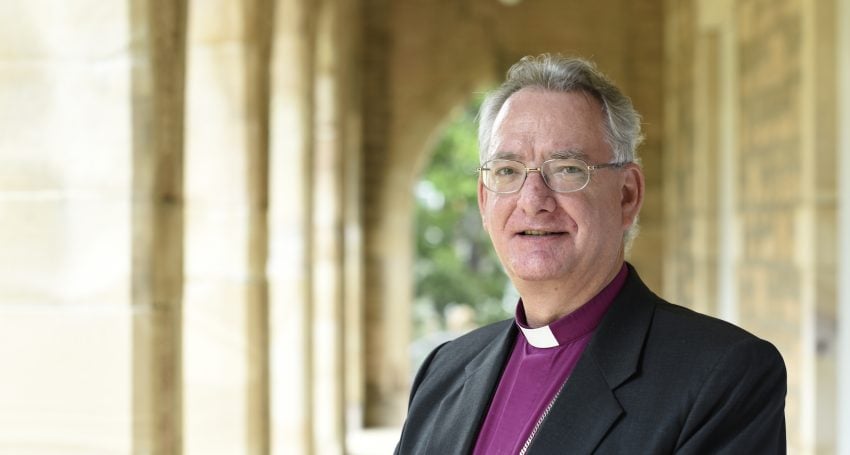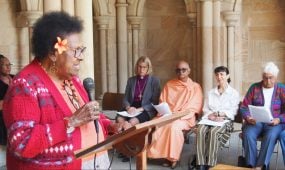Remembering who God is
Reflections
“The turmoil and suffering of the present are real and cannot be diminished or denied; however, they are not the whole or the greatest truth. Beyond them, there is God and life and love…This is our faith,” says Archbishop Phillip Aspinall in this Easter reflection

Currently, our local and international communities are vast melting pots of the full range of human behaviour and emotions as we navigate our way through the challenges presented by COVID-19. Gratitude and grief. Relief and guilt. Elation and disappointment. Hope, anxiety, courage and fear.
The mass media are overflowing with stories about the impacts of the virus. Some stories are tragic and harrowing, while others tell of beautiful kindness, startling generosity, and amazing sacrifice for others.
There are stories of people just making it home before travel bans kicked in. Stories of gratitude and narrow escapes. Yet alongside these are stories of devastation and hardship as people are trapped on the other side of the world, unable to get home or unable to travel to be with loved ones who need their care.
No one is left untouched. We feel for friends and family members, workmates and acquaintances, and for ourselves. It’s a truism: we’re all in this together.
Where is God amidst this turmoil and trial?
Some are wondering whether COVID-19 has been caused by God, as God’s judgement on the world because of human sinfulness. Others are seeing this as time to be the hands and feet of Jesus, standing in solidarity with and assisting the most vulnerable in our communities.
The great convictions of the Christian faith speak to us in this situation. The truth of the Incarnation is fundamental. We believe God took on human flesh in the person of Jesus of Nazareth and lived a human life. God did not remain distant and aloof, instead plunging into the midst of human toil and strife. That’s where God is found. Right in the midst of our fears and struggles. How do we recognise God in the midst of it all? Well, God looks like Jesus Christ. God is there, incarnate, in the face of the human being who despite being treated badly, in the face of the utmost provocation, demonstrates self-giving love.
Advertisement
The tell-tale signs of God’s presence, the footprints of God, if you like, are what St Paul calls the ‘fruit of the Spirit’. God can be recognised where there is love, joy, peace, patience, kindness, generosity, faithfulness, gentleness and self-control (Galatians 5.22-3). And where we strike the absence of such fruit, that is an invitation to us to incarnate God afresh, to be the body of Christ ourselves, to be the healing, reconciling, self-giving presence of Christ for the sake of the world God loves.
The other great fundamental conviction of the Christian faith is the resurrection. This is the unshakeable, sure and certain hope that ultimately nothing in all creation, not even death itself, can separate us from the love of God made known to us in Jesus Christ (Romans 8.38-9). The turmoil and suffering of the present are real and cannot be diminished or denied; however, they are not the whole or the greatest truth. Beyond them, there is God and life and love.
Advertisement
The psalms are full to overflowing with the stark reality of human life and emotion. That’s why they speak to us so powerfully in circumstances such as we now face. The psalmist agonises over this very question:
As a deer longs for the running brooks:
so longs my soul for you, O God.
My soul is thirsty for God, thirsty for the living God:
when shall I come and see his face?
My tears have been my food day and night:
while they ask me all day long, ‘Where now is your God?’
…
Why are you so full of heaviness my soul:
and why so unquiet within me?
O put your trust in God:
for I will praise him yet, who is my deliverer and my God.
…
I will say to God, my rock, ‘Why have you forgotten me:
why must I go like a mourner
because the enemy oppresses me?’
Like a sword through my bones,
my enemies mocked me:
while they ask me all day long ‘Where now is your God?’
Why are you so full of heaviness my soul:
and why so unquiet within me?
O put your trust in God:
for I will praise him yet, who is my deliverer and my God.
(Psalm 42.1-3, 6-7, 11-14)
The psalmist begins with questioning and doubt: ‘Why are you so full of heaviness my soul, and why so unquiet within me?’
Because in the face of tears, trouble and oppression, the psalmist has momentarily forgotten who God is. Then the psalmist remembers and says, ‘O put your trust in God: for I will praise him yet, who is my deliverer and my God.’
Even if we momentarily forget, God is present with us now and God will be with us beyond the present strife. This is our faith.






